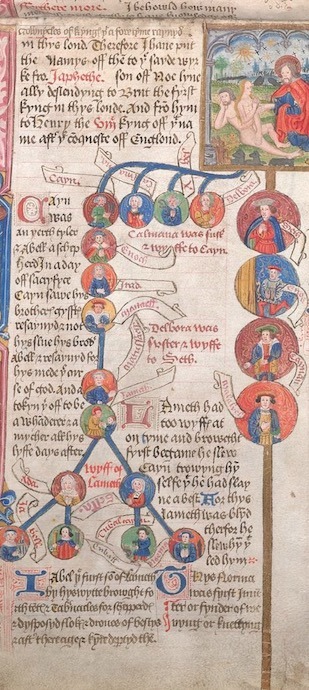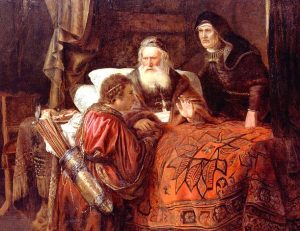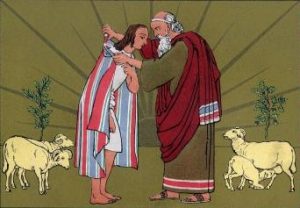 I used to continually struggle with some of the things that seem so foreign about the Old Testament. What is the reason for the endless lists of names? Or, why do we have the stories in Genesis about the sons of Jacob destroying the city of Shechem, or Reuben sleeping with his father’s servant girl? My expectation was that it was going to be a book of simple, understandable stories with morals to teach me how to live.
I used to continually struggle with some of the things that seem so foreign about the Old Testament. What is the reason for the endless lists of names? Or, why do we have the stories in Genesis about the sons of Jacob destroying the city of Shechem, or Reuben sleeping with his father’s servant girl? My expectation was that it was going to be a book of simple, understandable stories with morals to teach me how to live.
Genesis has a different purpose and a bigger story if you can get into the minds of ancient the Hebrews. What was the theme that they were developing?
It’s all about family, and inheriting God’s blessing.
First of all, we need know what the ancient Hebrews valued. In this culture, family and heritage was absolutely everything in terms of a person’s identity and goal in life. Becoming the father of a great nation would be like being elected president, an enduring legacy of honor – whereas to be childless was to be cursed and forgotten from history.
Usually, the children took on their family’s profession and spiritual life. It was also assumed that children would take on their father’s personality. If your father was wise, you would be wise, if he was warlike, you were warlike. As a result, explaining who was part of each family is very important to understanding society as a whole.
Family history is important in most traditional and non-Western cultures in the world, even today. A Bible translator from the Philippines told me that for many years, they used a New Testament translation which did not include the genealogy of Jesus in the book of Matthew, since the Americans thought it wasn’t important. As an afterthought they decided to include the genealogy of Jesus at the beginning.
When the Filipinos saw this new text they said, “So do you mean that this Jesus actually was a real person?” Without that genealogy, they had assumed for many years that this was a set of fables told about a magical, fictional hero! In many cultures in the world, a family line is essential to have any identity at all.
So, looking at Genesis we see that because Abraham was faithful, in his culture God gave him the greatest of blessings — to raise up a nation of people from him. Abraham would teach his children to follow the Lord, and a nation of believers would result, ideally. For an ancient person hearing this story, this would be a tremendous epic of how God would honor his covenant to this man who believed and obeyed him. Each time descendants are listed it shows that God has been honoring his covenant.
Bearing God’s Blessing
 After establishing a lineage, the next most important thing in Eastern cultures would be to understand the inheritance. In each family it was critical to establish an heir, typically the first-born son. He would receive a double portion of the inheritance and become the spiritual leader of the family, and the rest of the family would serve him. Genesis takes great care to explain in each generation who inherits the blessing: of Abraham’s sons, Isaac receives it rather than Ishmael. Of Isaac’s sons, Jacob receives it rather than Esau. It’s God’s choice each time an heir is chosen to carry on Abraham’s blessing.
After establishing a lineage, the next most important thing in Eastern cultures would be to understand the inheritance. In each family it was critical to establish an heir, typically the first-born son. He would receive a double portion of the inheritance and become the spiritual leader of the family, and the rest of the family would serve him. Genesis takes great care to explain in each generation who inherits the blessing: of Abraham’s sons, Isaac receives it rather than Ishmael. Of Isaac’s sons, Jacob receives it rather than Esau. It’s God’s choice each time an heir is chosen to carry on Abraham’s blessing.
If you understand this underlying theme of tracing God’s blessing and establishing who would carry it to the next generation, it makes many stories make a lot more sense. A large amount of time is spent on stories of Jacob’s family, to see what happens to Jacob’s twelve sons, because each will be head of one of the twelve tribes of Israel.
Let’s review who they were:
| Reuben | Leah |
| Simeon | Leah |
| Levi | Leah |
| Judah | Leah |
| Issachar | Leah |
| Zebulun | Leah |
| Dinah (daughter) | Leah |
| Joseph | Rachel |
| Benjamin | Rachel |
| Dan | Bilhah |
| Naphtali | Bilhah |
| Gad | Zilpah |
| Asher | Zilpah |
(Note that in addition to Jacob’s two wives, Leah and Rachel, two more women bear children for him. This was because it was acceptable at that time to have a servant girl bear children for a wife, to build up the family of descendants.)
After the children are born, the primary plot of Genesis revolves around who would receive the blessing, and why one son rather than another receives it. Jacob declares the blessings in Genesis 49 when he gives his last will before he dies. The very firstborn of the family is Reuben. Why doesn’t he receive the blessing? Because he dishonored his father by sleeping with Bilhah he is disqualified as the heir (Gen 35:22, Gen. 49:3). Simeon and Levi are next in line, but they are both disqualified because they were the ones who destroyed the city of Shechem (Gen. 34:25, Gen. 49:5-7).
The reason why the Bible includes the ugly stories about Reuben, Levi and Simeon was not to serve as moral examples, but to show how the actions of the patriarchs influenced God’s decisions about who would bear his blessing.
Jacob’s Chosen Heir
What is interesting is that Jacob had his own ideas of who should be the heir. His clear favorite was Joseph, the first born son of the wife that he loved. That is the source of conflict in the family.
 In many cultures a special garment would be given to the heir to designate his status, and that is why Jacob gave Joseph the coat. That is also why Joseph’s dreams that his family will bow down to him made his brothers so furious.
In many cultures a special garment would be given to the heir to designate his status, and that is why Jacob gave Joseph the coat. That is also why Joseph’s dreams that his family will bow down to him made his brothers so furious.
When Jacob was old he gave Joseph the inheritance of the first-born, a double portion of the estate. He does this by adopting Joseph’s two sons, Ephraim and Manassah as sons of his own, and giving each an inheritance. They will both be included in the tribes of Israel, and are sometimes called the tribes of Joseph.
God’s Ultimate Decision
With all these twists and turns, you’ll still be surprised to learn which of the tribes does God chooses to carry his ultimate blessing. He uses Joseph to save his family, so in a sense he blesses Joseph. But, believe it or not, the ultimate blessing goes to Judah, the fourth-born son of Leah, the unloved wife, who becomes the instrument of God’s redemptive plan. He is the one who will ultimately give rise to Christ.
An obviously messianic passage says, “The scepter will not depart from Judah, nor the ruler’s staff from between his feet, until he comes to whom it belongs, and the obedience of the nations is his” (Gen 49:10). This will be fulfilled at first when David, of the tribe of Judah becomes king, and then when Jesus, the Lion of the tribe of Judah, arrives on earth!
~~~~
Photos: BL King’s 395 [Public Domain], Dulwich Picture Gallery [Public domain], Owen Jones [Public domain]

